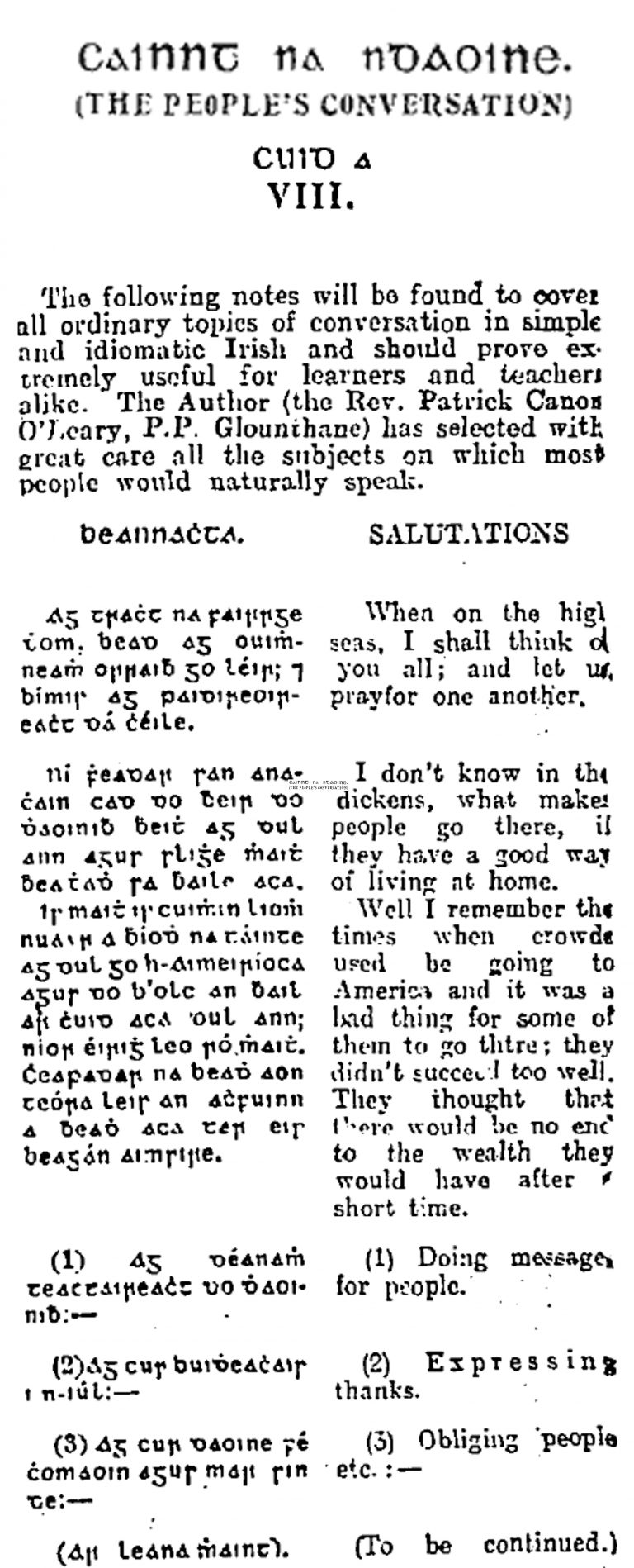In This Section
- Home
- Collections
- Atlas Resources for Schools
- Cork Fatality Register
- Mapping the Irish Revolution
- Mapping IRA Companies, July 1921-July 1922
- Mapping the Burning of Cork, 11-12 December 1920
- Martial Law, December 1920
- The IRA at War
- The Railway Workers’ Munitions Strike of 1920
- The Victory of Sinn Féin: The 1920 Local Elections
- The War of Words: Propaganda and Moral Force
- The IRA Offensive against the RIC, 1920
- De Valera’s American Tour, 1919-1920
- The British Reprisal Strategy and its Impact
- Cumann na mBan and the War of Independence
- The War Escalates, November 1920
- The War of Independence in Cork and Kerry
- The Story of 1916
- A 1916 Diary
- January 9-15 1916
- January 10-16, 1916
- January 17-23, 1916
- January 24-30, 1916
- February 1-6 1916
- February 7-14, 1916
- February 15-21, 1916
- February 22-27, 1916
- February 28-March 3, 1916
- March 6-13,1916
- March 14-20, 1916
- March 21-27 1916
- April 3-9, 1916
- April 10-16, 1916
- April 17-21,1916
- May 22-28 1916
- May 29-June 4 1916
- June 12-18 1916
- June 19-25 1916
- June 26-July 2 1916
- July 3-9 1916
- July 11-16 1916
- July 17-22 1916
- July 24-30 1916
- July 31- August 7,1916
- August 7-13 1916
- August 15-21 1916
- August 22-29 1916
- August 29-September 5 1916
- September 5-11, 1916
- September 12-18, 1916
- September 19-25, 1916
- September 26-October 2, 1916
- October 3-9, 1916
- October 10-16, 1916
- October 17-23, 1916
- October 24-31, 1916
- November 1-16, 1916
- November 7-13, 1916
- November 14-20, 1916
- November 21-27-1916
- November 28-December 4, 1916
- December 5-11, 1916
- December 12-19, 1916
- December 19-25, 1916
- December 26-January 3, 1916
- Cork's Historic Newspapers
- Feature Articles
- News and Events
- UCC's Civil War Centenary Programme
- Irish Civil War National Conference 15-18 June 2022
- Irish Civil War Fatalities Project
- Research Findings
- Explore the Fatalities Map
- Civil War Fatalities in Dublin
- Civil War Fatalities in Limerick
- Civil War Fatalities in Kerry
- Civil War Fatalities in Clare
- Civil War Fatalities in Cork
- Civil War Fatalities in the Northern Ireland
- Civil War Fatalities in Sligo
- Civil War Fatalities in Donegal
- Civil War Fatalities in Wexford
- Civil War Fatalities in Mayo
- Civil War Fatalities in Tipperary
- Military Archives National Army Fatalities Roll, 1922 – 1923
- Fatalities Index
- About the Project (home)
- The Irish Revolution (Main site)
Each week, we look back at what was “in the news” the same week 100 years ago – as reported in the Cork Examiner in 1916.
By Nicola Stathers
Tuesday, September 26, 1916
- Echo of the Dublin Riots
At Brentford Police Court this morning, William George Hollwey Miller, 24, a tutor, of Hartington road, Ealing, was charged with being an absentee under the Reserve Forces Act. A Police Sergeant stated that acting on information, he saw the prisoner, who told him he was not liable to serve, as he was an Irishman, and automatically exempt.
Major Smith said that he received information that the prisoner was of military age, and in occupation in Ealing, and he called upon him to attend at the recruiting office. The prisoner came to the office, and made the following statement: “I am an Irishman and a rebel, and I took part in the Dublin riots. I am a member of a Society hostile to England, and will not serve England in any way. I am an avowed enemy of England, and I will not serve, no matter what course you may take. I am an Irishman, and will not help England in any way.” Witness considered that the accused was a man hostile to England, and should be restrained in some way, no matter what course was followed, but he thought he was fully qualified to serve in the army.
Prisoner – Did I use the word “Rebel”?
Witness – I think you said so. You said you took part in the Dublin riots. I thought you were very frank in your statements and I was surprised.
At the request of the witness, the accused was remanded for a week.
Wednesday, September 27, 1916

- Mr. Eoin McNeill’s Salary
Mr. Michael A. Corrigan, solicitor, applied on behalf of Mr. Eoin McNeill, who is at present undergoing a life sentence in connection with the recent rebellion, to have Mrs. Agnes McNeill appointed as administrator over her husband’s monetary affairs. Mr. Corrigan explained that his application was made under the Forfeiture Act by which it was ordained that if no administrator or curator were appointed over the property of a convict, and if the justices at Petty Sessions were satisfied that such was the case, they could appoint an administrator. In the present case the sum of £97 5s was due to Mr. McNeill as part of his salary as professor in the National University, and he accordingly applied to have Mrs. McNeill made administrator. …The magistrates made the order sought.
Thursday, September 28, 1916
- Manipulation of the Time
Lest changing of the clocks on next Saturday night should be done in a careless or negligent manner, the Government has taken the unusual step of issuing a notice warning the public on the point. The Home Office does not undertake to instruct the Irish people on this manipulation of the time for it is expected a separate notice will be issued for this country in view of the recently passed Time (Ireland) Act, 1916, which, as is now well known, substitutes Greenwich for Dublin time as the “normal” time in Ireland. As a consequence of the Act the Irish will adjust their clocks not by one hour, but only by 35 minutes. As this moving back process recklessly done is likely to cause injury to certain timepieces it may be no harm to quote the official warning….
Friday, September 26, 1916
- Cainnt na nDaoine continues…

Saturday, September 30, 1916
That the war will end before the autumn of 1917 is still the hope of some, but is now the opinion of no more than a handful. It is no longer a State secret that the Allied governments are preparing to prosecute the campaign, not only through the winter of 1916, but also through the summer of next year. And part of the practical preparation for the winter and ensuring summer campaign is the provision and training of adequate reserves of men.
This need for men for the final phase, has led in England to the revision of exemptions and to the suggestions for raising the age limit for service, from 41 to 45. It has also led to a revival of the proposals for extending the Irishmen resident in Ireland the obligation of military services.
Monday, October 2, 1916
- Heavy Rain in Cork
Rain, which had been threatening for some days past, fell heavily in Cork last night, and for hours a perfect deluge drenched the city. IN many places the sewers were choked, resulting in the flooding of thoroughfares in the immediate vicinity. Particularly evident was this in the Victoria road, where residents had to wade knee deep to reach or leave their houses.
